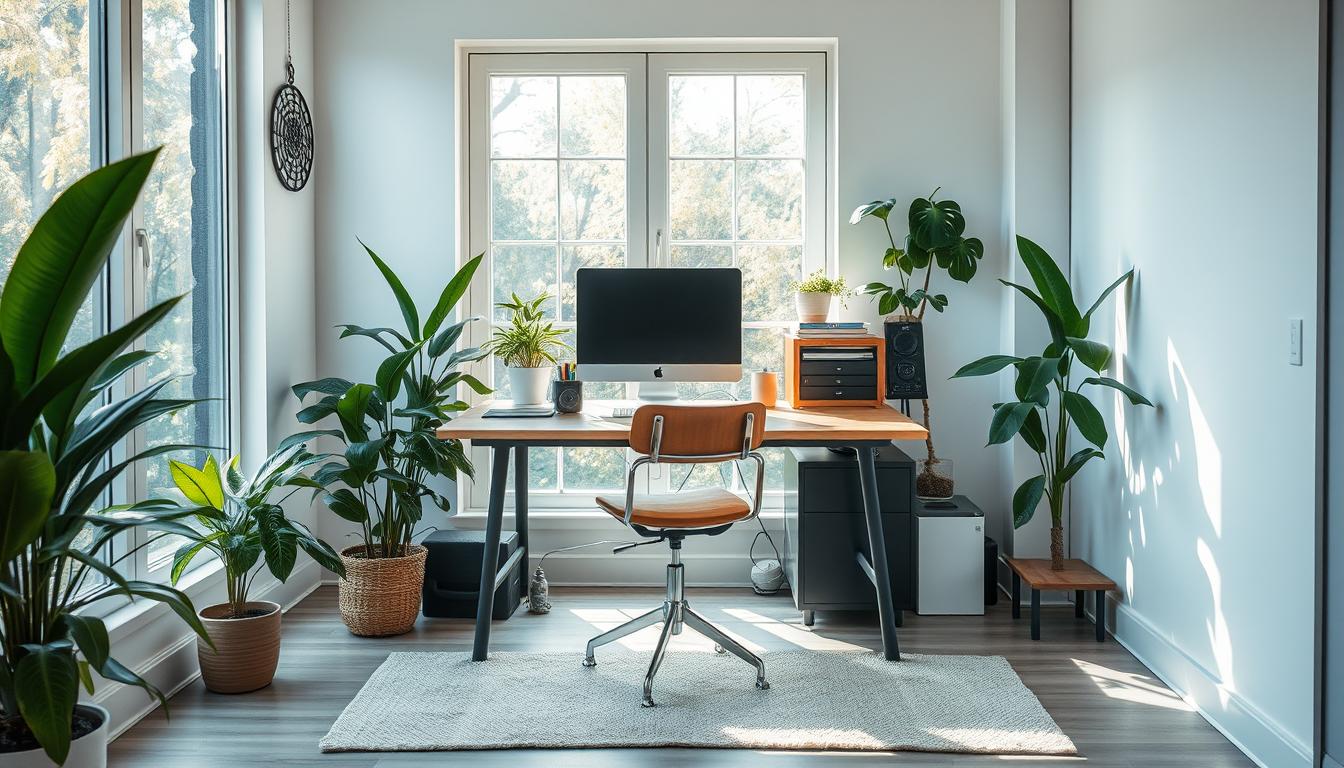Last Updated on December 9, 2025
Staying motivated at work can seem overwhelming, with numerous distractions and tasks vying for your attention. Yet, by understanding self-motivation and using effective techniques, you can boost your productivity. This article presents strategies to help you stay focused, whether you’re working remotely or in an office.
Studies highlight the importance of a clear work schedule for staying on track. Additionally, having a dedicated workspace away from your bedroom can enhance productivity and support better sleep. As you seek ways to maintain daily motivation, remember that even small goals can be powerful. By dividing tasks into smaller, achievable parts and setting time limits, you can increase your accountability and reduce distractions. Let’s explore these strategies further to help you excel in your daily work life.
Key Takeaways
- Establish a clear work schedule to enhance focus and productivity.
- Create a designated workspace to separate work from personal life.
- Break large tasks into smaller, manageable time blocks.
- Implement time management techniques to boost self-motivation.
- Engage in regular breaks to recharge your mental energy.
- Acknowledge and reward yourself for completing tasks.
- Link daily goals to broader career aspirations for sustained motivation.
Understanding the Importance of Staying Motivated
Staying motivated is crucial for reaching your goals and keeping a positive outlook during your workday. When motivation drops, your work quality may decline, leading to feelings of hopelessness. Using motivation techniques helps you tap into your full potential and boosts your overall well-being. Research shows that motivated people tend to be more satisfied with their jobs and more engaged in their work.
Understanding what drives your motivation can shed light on your inner workings. It’s important to distinguish between extrinsic and intrinsic motivation. Extrinsically driven motivation, like getting paid or receiving praise, may give you a short-term boost. However, intrinsic motivation, which comes from enjoying an activity or feeling competent in it, leads to deeper satisfaction and long-term benefits. Doing things for the sheer pleasure they offer or the skills they help you develop can greatly increase your productivity.
Think about how increased motivation benefits society. Motivated individuals foster better relationships and are more satisfied with their jobs. Recognizing the value of motivation lets you adopt effective strategies that keep you driven, enabling you to approach tasks with enthusiasm.
Adding practical strategies to your daily life can help maintain your motivation. Building self-control and focusing on the intrinsic joy of activities will empower you to overcome obstacles and stay engaged. In striving for a lasting positive mindset, remember that how you view tasks is key to your success.
Set Smaller Goals for Daily Success
Setting smaller goals is a key to effective goal setting. It helps avoid the feeling of being overwhelmed by a large project. By breaking it down into smaller tasks, you boost your daily motivation. This approach not only makes your goals clearer but also helps you feel accomplished regularly as you hit these smaller milestones.
The Power of Bite-Sized Tasks
Over 2,000 years ago, Aristotle highlighted the significance of goal-setting with his saying, “Well begun is half done.” Setting specific, smaller goals makes it easier to stick to them. It simplifies tracking progress, showing how daily achievements add up to the larger goal. Starting with a clear first step is crucial for taking action, and breaking down big tasks boosts clarity and motivation.
Feeling Accomplished with Smaller Objectives
Finishing these smaller tasks boosts your motivation by giving you a sense of accomplishment. Celebrating these wins keeps you motivated for future challenges. Studies indicate that daily goal-setters have a higher success rate. With each task you complete, your dedication to your long-term goals grows, leading to greater achievements.

Take Regular Breaks to Recharge
Regular breaks are crucial for sustaining productivity and well-being. Scheduled downtime rejuvenates your mind and body, boosting your focus. Research shows that breaks lower stress levels, making it simpler to concentrate after returning to work. These breaks not only improve performance but also enhance creativity and support a balanced work-life.
Benefits of Scheduled Downtime
Scheduled downtime brings significant benefits for both mental health and productivity. Here are some key advantages:
- Improves memory and recall, aiding in tasks that require deep focus.
- Reduces decision fatigue by limiting excessive phone use.
- Lessens eye strain from prolonged screen time due to blue light.
- Boosts mental health through creative activities that stimulate dopamine.
- Encourages physical activity, enhancing alertness and motivation.
- Allows for self-care, such as meditation or healthy snacks, to reduce stress.
- Supports social connections, which are vital for emotional well-being.
Implementing the Pomodoro Technique
The Pomodoro Technique is a powerful tool for staying motivated during the workday. It involves working in focused 25-minute intervals, followed by a 5-minute break. This pattern helps maintain motivation. Timers or apps can aid in tracking breaks and managing screen time effectively.
Studies confirm that regular breaks, including lunchtime breaks, enhance well-being and productivity. Detaching from work regularly can increase energy levels, reduce fatigue, and improve focus when you return to tasks.
Create a Workspace That Inspires You
A well-designed workspace is crucial for maintaining self-motivation during your workday. Creating an environment that aligns with your preferences can boost your enthusiasm for daily tasks. By incorporating elements that support comfort and creativity, you can create a space that encourages inspiration.
Designing a Personalized Work Environment
Your workspace should mirror your personality and goals. Consider adding elements such as:
- Color combinations that spark creativity—colors like orange can energize your imagination.
- Plants to enhance air quality and bring in a natural element.
- Ergonomic furniture for comfort and to support good posture, preventing fatigue.
- Good lighting, including LED fixtures with dimmers, to adjust brightness as needed.
- Personal touches, like motivational quotes or images on a mood board, that reflect your aspirations.
Minimizing Clutter for Better Focus
A clutter-free space not only improves focus but also boosts productivity. Research shows that disorganization can significantly impede your efficiency. By setting clear boundaries in your workspace, you reduce distractions. Here are some tips:
- Organize office supplies and keep them within easy reach to streamline your tasks.
- Regularly declutter your desk, ensuring only necessary items are visible.
- Assign specific areas for different tasks to help you stay focused on priorities.
- Include designated break areas to recharge and avoid mental exhaustion.
Understand Your Productive Hours
Knowing your productive hours is crucial for staying motivated. Each person experiences varying energy levels throughout the day. Identifying these patterns can enhance task management and lead to success. For example, you might be more focused on Tuesday mornings than on Friday afternoons.
Keeping a diary to track your energy and productivity levels is beneficial. This practice boosts self-awareness, helping you understand which hours are most effective. By noting when you’re most efficient, you can schedule your most challenging tasks during these peak times.
Integrating mindfulness breaks, such as daydreaming or short meditation, during low-energy periods can refresh you. Moreover, managing distractions and eating healthily significantly impacts your productivity. By cultivating these habits, you enhance your work potential, ensuring sustained motivation and improvement.
Focus on High-Impact Tasks
Concentrating on high-impact tasks is a top motivation technique. It helps you focus on what’s most important in your daily routine. This method boosts your productivity and satisfaction. It keeps you engaged and motivated all day long.
Identifying What Matters Most
It’s crucial to distinguish urgent tasks from those that truly add value. Take time to review your daily activities. Identify tasks that support your long-term goals. By focusing on these, you stay focused and maximize your efforts.
Prioritizing Tasks for Greater Motivation
After pinpointing your high-impact tasks, set a hierarchy. Arrange your to-do list to prioritize tasks with the biggest impact. This strategy helps you use your energy more effectively, keeping motivation high. A consistent daily plan and tracking progress can also boost your productivity. For more on optimizing your workflow, check out this resource. It provides insights on improving workplace productivity.
Staying Motivated Through Accountability
Accountability is key to boosting your self-motivation during your workday. Having someone to share your goals with makes it simpler to stay focused. This support can enhance motivation techniques and keep you committed to your tasks.
Finding a Work Buddy
Pairing up with a colleague can significantly improve your motivation. A work buddy offers not just friendship but also a sense of accountability, crucial for self-motivation. You can set goals and celebrate your achievements together, which strengthens your motivation. This teamwork makes the work environment less isolating, especially for remote workers. Studies show that accountability is a major motivator in fields like insurance, highlighting the importance of teamwork.
Setting Up Regular Check-ins
Regular check-ins are crucial for keeping everyone on track. Talking about progress, challenges, and strategies helps maintain open communication. These discussions allow for plan adjustments and reinforce your goal commitment. Tools like Asana can help visualize your progress and increase accountability. Setting clear deadlines and reviewing them often keeps you focused and motivated. This approach helps you overcome obstacles with confidence and maintain self-motivation.
Invest in Your Daily Routine
Creating a strong daily routine is key to keeping up your motivation and a positive outlook. Morning routines are especially powerful, setting the day’s tone. Starting your day with activities that uplift and energize you can greatly increase your productivity.
The Role of Morning Rituals
Adding morning rituals to your routine lays the groundwork for success. You might think about doing meditation, journaling, or some light exercise to kick off your day. These activities boost your focus and mental clarity, making you feel more invigorated. Feeling happy makes it easier to keep that positive vibe going all day at work.
Preparing Nourishing Meals and Snacks
Getting meals ready in advance is vital for staying motivated. Spending time on meal planning not only feeds your body but also keeps your energy up. Healthy eating affects your performance and ability to handle daily tasks. Make meal prep a weekly task, so you always have healthy food ready. This lets you concentrate on your work without getting sidetracked, keeping your motivation up.

Get Moving: The Physical Activity Factor
Incorporating physical activity into your daily routine boosts mental clarity and energy. It’s crucial for staying motivated and making workdays fulfilling. Regular breaks for stretching or light exercises can significantly improve productivity and mood. This section delves into how to integrate physical activity into your workday to enhance self-motivation and overall well-being.
Incorporating Stretch Breaks
Short stretch breaks throughout the day offer numerous benefits. Simple stretching exercises can:
- Alleviate tension in your muscles.
- Improve circulation and energy levels.
- Enhance focus and concentration.
Research shows that physical activities for just 22 minutes daily can greatly boost stamina. It’s essential to find activities you enjoy. When movement is linked to pleasure, staying motivated becomes simpler.
The Mind-Body Connection
The link between mental health and physical activity is deep. Moving your body releases endorphins, which lift your mood. This natural boost aids in self-motivation and eases the challenge of staying engaged at work. For example:
- Joining group activities, like running clubs, builds camaraderie and accountability.
- Enjoying sports with friends turns exercise into a social event.
- Finding pleasure in movement rather than seeing it as a chore increases your commitment to staying active.
By adding more enjoyable physical activities to your routine, you strengthen your mind-body connection. This fosters sustained motivation. Always celebrate your small physical achievements to keep the motivation high.
Creating Clear Boundaries Between Work and Home
In today’s fast-paced world, setting clear boundaries between work and home is crucial for your productivity. When work and personal life blend, you risk burnout and decreased motivation. By defining specific work hours and spaces, you boost your self-motivation and focus.
A graphic designer found it hard to meet deadlines, getting pulled into urgent projects. This shows the need for healthy boundaries for a better work-life balance. It’s important to communicate these boundaries to your family and colleagues for mutual respect. Without them, managing tasks becomes inefficient, making your day more complicated.

Healthy work boundaries are key for emotional stability, reducing anxiety, and boosting productivity. Knowing the difference between boundaries and barriers helps in better communication and teamwork. It’s also vital to know how to communicate your boundaries to streamline your workflow, making task management more effective.
- Identify your optimal work style and times.
- Establish specific work hours to maintain a structured routine.
- Engage in self-care activities to prevent burnout.
- Learn to say “no” when needed to prioritize your tasks effectively.
Committing to clear boundaries protects your time and energy. This approach reduces stress and creates a more organized work environment. It supports your productivity and overall well-being.
Recognize and Celebrate Small Wins
Recognizing and celebrating small victories is vital for maintaining a positive outlook while chasing your goals. Acknowledging minor achievements lifts your spirits and boosts confidence. This, in turn, keeps you motivated for the bigger picture.

Rewarding Yourself for Completed Tasks
Creating a habit of rewarding yourself after finishing tasks fosters steady advancement. Setting SMART goals helps define clear milestones. Keeping track of your progress through journals or sharing with others enhances self-esteem and reinforces positive habits.
Small wins, even amidst challenges, keep you moving towards long-term goals.
Building Momentum with Acknowledged Successes
Every small win builds your confidence, empowering you to face bigger hurdles with confidence. Celebrating these victories not only motivates you but also uplifts those around you, creating a supportive work environment. Simple gestures like words of appreciation or personalized notes can significantly boost team morale and prevent burnout.
Embracing recognition leads to sustained effort and ongoing improvement, propelling you towards ultimate success.
Learning to Forgive Yourself
Forgiveness is key to cultivating a positive mindset that boosts self-motivation. Acknowledge that perfection is unattainable. By accepting mistakes, you enhance mental resilience, making it easier to face challenges.
Letting Go of Perfectionism
Perfectionism breeds stress and sets unachievable standards. Ditching these ideals fosters a healthier self-image. This mindset shifts focus from flawless performance to steady progress. Embracing imperfection nurtures a kinder inner dialogue, crucial for emotional health.
Building Mental Resilience
Mental resilience is vital for bouncing back from setbacks and learning from errors. *Self-forgiveness* creates a nurturing inner space. Being kind to yourself builds your self-motivation. This approach also involves celebrating small wins, which bolsters a positive outlook. As you improve in self-forgiveness, emotional stability and overall health may also enhance.

Conclusion
Staying motivated at work is not just a fleeting feeling; it’s a continuous journey. It requires strategies tailored to your unique work style. Techniques like setting smaller goals and taking regular breaks can boost your daily motivation. Additionally, a workspace that inspires you can enhance your well-being and productivity.
Adaptability is key, as motivation can vary due to emotional influences. Cultivating self-motivation is crucial, especially in today’s digital world where distractions abound. It’s essential to focus on what truly matters. Regularly replenishing your motivation and identifying energy-draining activities can lead to sustained growth and engagement in your tasks.
Consider how rituals and daily habits affect your motivation. While willpower is limited, commitment to action, even during tough times, can lead to significant achievements. Success is not solely about knowledge or talent but about your willingness to act and engage in self-reflection. This ensures you excel in both your professional and personal life.








